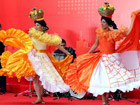| Videos | ? Latest |
|
? Feature | ? Sports | ? Your Videos |
Costa Rica marks its Pavilion Day

Friday marks the National Pavilion Day of the Central American country Costa Rica at the Shanghai World Expo. The Pavilion showcases how urban residents of Costa Rica live in harmony with nature, and if you need a more immediate reason to pay a visit...I've heard they also have a variety of mouthwatering local cuisine...
Such a grand occasion can't take place without stage performances. Artists from Costa Rica celebrate their National Pavilion Day with traditional songs and dances. The show is highlighted by the band Malpais, an important influence in the Costa Rican rock music scene today. The group fuses traditional Costa Rican folk and Latin with jazz and rock, resulting in a unique music style that has met with great success in Costa Rica and surrounding countries.
Costa Rica Pavilion is located within Zone C of the Expo Site. With the theme "No Artificial Ingredients", the pavilion invites visitors to try traditional Costa Rican food, and taste their coffee. Costa Rica is famous for its gourmet coffee beans, with Costa Rican Tarrazu among the finest Arabica coffee beans around the world used to make espresso.
As visitors enter the Costa Rica Pavilion, they will first be welcomed by a bronze statue called "Continue". The piece is created by a renowned Costa Rican sculptor who goes by the pseudonym Deredia. According to the artist, his work says a lot about Costa Rican society: instead of separating technological development and the environment, Costa Rica tends to be a country of peace and love.
The design of Costa Rica Pavilion is inspired by the stone sphere symbolizing the aborigines who first inhabited the land. It is also a cultural symbol characterizing Costa Rica. The core themes developed in the pavilion are Peace, Industry, Investment, Education and Environment.
The word "Costa Rica" means "Rich Coast" in the Spanish language. The country is bordered by Nicaragua to the north, Panama to the east and south, the Pacific Ocean to the west and south, and the Caribbean Sea to the east. Costa Rica boasts a wealth of wild life and natural resources that are well preserved and live in harmony with humans.
Costa Rica covers a geographical area of around 51-thousand square kilometers, half of which is covered by forests. Although small in area, Costa Rica is among the leading countries around the world regarding its environmental protection efforts. So far around 95 percent of the country's electric power comes from clean energy, such as wind and hydro-power.
A dozen volcanos are spotted around the territory of Costa Rica, among which Turrialba and Arenal stand out as being most active. Turrialba Volcano, situated in the capital San Jose, is 3340 meters above sea level. In January this year, the volcano emitted ash after more than a hundred-year hiatus. Arenal Volcano, lower than Turrialba, is one of the major tourist attractions of the country. It is geologically considered a young volcano. On May the 25th this year, Arenal emitted a large amount of ash, forcing the evacuation of several nearby villages.
 0
0 






